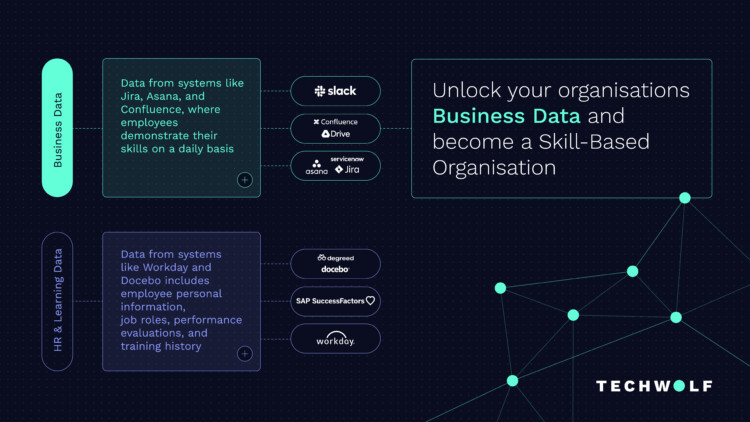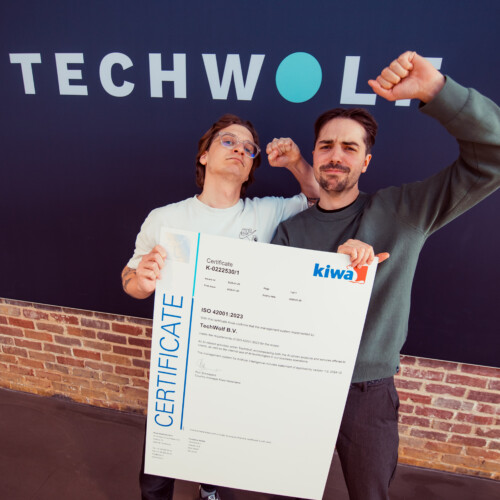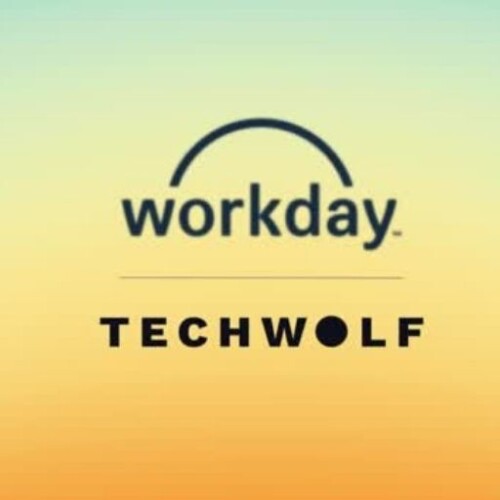How unlocking skills lies in capturing business data
To get skill data deep into your operations, business data, in harmony with HR data, is key.
A successful skills transformation is driven by HR but leveraged by the entire business. Half of the skills demonstrated in business data cannot be found in HR data, so overlooking this impacts an organisation’s ability to shift towards becoming truly skill-based. Only by using detailed and accurate skill data from across a business can organisations shift to a way of working that properly utilises the skills of their workforce.
To gain access to skill data for your business, you need to infer it from business data.
Skills are not just for HR
In any conversation about skills, you’re often redirected to the nearest HR person. However, skills are essential to every function—just as finance departments manage money to enable a business to function, HR focuses on an organisation’s biggest cost centre: their people.
With a skill-based approach, HR will typically be the driver of change, but that doesn’t mean that the SBO (skill-based organisation) should be contained within the HR function. A skill infrastructure that supports skill-based work throughout the business has to meet the needs of every function and interact with the business as a whole.
Skill data for every purpose
When looking at the broader landscape of skills, we can identify three broad categories:
- Soft skills
- Functional skills
- Knowledge & technologies
Within this structure, we can see a whole range of skills, from ones that tend to be consistent over time to those that are more volatile, shifting quickly in terms of supply and demand. If you only consider soft and functional skills, you can leverage skill data for longer-term things like recruitment and talent mobility without too much friction. However, when you get closer to immediate business operations, it becomes clear that knowledge and technologies play just as big a part, as they tend to form a hard requirement for someone to be able to complete a given task.
HR data alone cannot thoroughly infer this category of skills; metrics such as working history and performance reviews focus on the long term, with a wealth of soft and functional skills. On the other hand, business data such as data from project tools or documentation can inform about a wealth of tools and technologies. To get skill data deep into your operations, business data, in harmony with HR data, is the key.
Skills in business operations
Connecting business data sources to infer skills is not just about creating better profiles for your employees but connecting skills both to people and the work they do. For example, an integration with Jira can provide a software development team with the data to identify:
- The skills they need for their next sprint, and in what proportions.
- Gaps between the team and the planned work.
- Bottlenecks — skills in high demand for a planned sprint that only rest with a small number of people.
- Risks — individuals who are the sole possessors of skills needed, which could cause trouble in case of illness or holidays.
- Experts and the adoption of new technologies within the team.
Each of these things can be done within the development team, driving business value, but it shouldn't stop there. The data should then feed back into the company-wide view of skills, deepening and enhancing it.
Data as a journey
When considering potential data sources to use for skill inference, the possibilities can feel a bit overwhelming. It can help to see building your skill data as a journey, on which improvement of your data and value creation go hand in hand. If you start out exclusively using HR and learning data, that sets a great foundation, as well as helping you tackle things like internal mobility and giving a view of skills across the company. Business data can then be layered on one source at a time, focusing on populations that want to make deeper use of the resulting skill data.

Getting started with skills
At TechWolf, we pride ourselves in working collaboratively with clients to help identify what internal data they have available, its quality and relevance. Combined with external data sources we create a comprehensive, real-time, dynamic view of the skills of your workforce. Working with existing tech stacks, with an API-first approach, we help enterprise businesses to supercharge their journey to becoming skill-based.
🛡️ Data privacy: using business data responsibly
Questions about GDPR and data privacy are common in organisations starting out their journey towards skill-based work. It's worth noting that most business data sources inherently contain low levels of personally identifiable information, primarily focusing on work rather than the individual employees who do it. Nonetheless, because this data is linked to employees, a well-considered approach is crucial. Under GDPR, companies have a legitimate interest in processing such employee-linked data for HR management, which enables companies to use this data for purposes like skill inference. In addition, TechWolf helps customers leverage its approach to responsible AI, as detailed in our World Economic Forum article.




